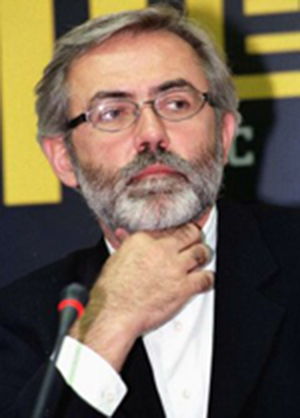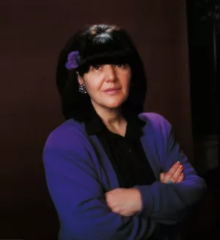
Zoran Đinđić was a Serbian politician and philosopher who served as the prime minister of Serbia from 2001 until his assassination in 2003. He was the mayor of Belgrade in 1997. Đinđić was a long-time opposition politician and held a doctorate in philosophy.

Vojislav Šešelj is a Serbian politician and convicted war criminal. He is the founder and president of the far-right Serbian Radical Party (SRS). Between 1998 and 2000, he served as the deputy prime minister of Serbia.

Ivan Stambolić was a Serbian politician who served as the president of the League of Communists of Serbia (SKS) from 1984 to 1986. A prominent member of SKS, he also served as prime minister of Serbia from 1978 to 1982 and as president of Serbia from 1986 to 1987.
The Death of Yugoslavia is a BBC documentary series first broadcast in September and October 1995, and returning in June 1996. It is also the title of a BBC book by Allan Little and Laura Silber that accompanies the series. It covers the collapse of Yugoslavia, the subsequent wars and the signing of the final peace accords. It uses a combination of archived footage interspersed with interviews with most of the main players in the conflict, including Slobodan Milošević, Radovan Karadžić, Franjo Tuđman and Alija Izetbegović, as well as members of the international political community, who were active in the various peace initiatives.

The overthrow of Slobodan Milošević began in the Federal Republic of Yugoslavia after the general election on 24 September 2000 and culminated in the downfall of Slobodan Milošević's government on 5 October 2000. As such, it is commonly referred to as the 5 October Revolution or colloquially the Bulldozer Revolution, after one of the most memorable episodes from the day-long protest in which a heavy equipment operator charged the Radio Television of Serbia building, considered to be symbolic of the Milošević regime's propaganda.

Slavko Ćuruvija was a Serbian journalist and newspaper publisher. His murder on 11 April 1999 in Belgrade, FR Yugoslavia provoked international outrage and wide condemnation. In January 2014 two people were arrested and two others named by the Serbian police as suspects in Ćuruvija's murder, including Radomir Marković, former head of the State Security Directorate (RDB) from 1998 to 2001.

The Yugoslav Left was a political party in Serbia and the Federal Republic of Yugoslavia. At its peak, the party had 20 seats in Republic of Serbia's National Assembly following the 1997 general election.

The Central Committee of the League of Communists of Serbia (SKS) held its 8th Session in Belgrade on 23–24 September 1987. This session proved to be a turning point in the history of Serbia and Yugoslavia, as it marked the rise of Slobodan Milošević as the key force in Serbian politics.

Pravda was a daily tabloid newspaper published in Belgrade, Serbia.

The Republic of Serbia was a constituent state of the Federal Republic of Yugoslavia between 1992 and 2003 and the State Union of Serbia and Montenegro from 2003 to 2006. With Montenegro's secession from the union with Serbia in June 2006, both became sovereign states in their own right for the first time in nearly 88 years.

Slobodan Milošević was a Yugoslav and Serbian politician who was the President of Serbia between 1989–1997 and President of the Federal Republic of Yugoslavia from 1997 until his оverthrow in 2000. Milošević played a major role in the Yugoslav Wars and became the first sitting head of state charged with war crimes.

The State Security Directorate, or simply State Security, was the security agency within the Ministry of Internal Affairs of Serbia tasked with protecting the country from internal threats.

The Eternal Flame is a memorial in the Park of Friendship in Belgrade, Serbia. It is dedicated to the military and civilian casualties resulting from the NATO bombing of Yugoslavia in 1999 and symbolizes the resistance of the Serbian nation to the attack.

Dragiša "Buca" Pavlović was a Serbian and Yugoslav politician, known primarily as one of the top figures who publicly opposed Slobodan Milošević and tried to prevent his rise to power. Pavlović was Chairman of the City Committee of the League of Communists of Belgrade from 23 April 1986 to 24 September 1987.
The situation in Kosovo, which does not improve with the desired and promised speed, creates a dangerous atmosphere where every word spoken against Serbian nationalism is perceived as nationalism. Passionate words can only bring fire.

Marko Slobodanov Milošević is the son of Mirjana Marković and Slobodan Milošević, the deceased former president of Serbia and president of the Federal Republic of Yugoslavia. He was allegedly involved in organized crime in Serbia during the Yugoslav Wars until he fled the country following his father's removal from power on 5 October 2000. Milošević was later granted refugee status by Russia.

Ljiljana Habjanović Đurović is a Serbian author.

Dragoslav "Draža" Marković was a Serbian communist politician, serving as President and Prime Minister of Serbia.

Ivan Stambolić was a Serbian politician. In his career he rose to become the president of Yugoslavia. In August 2000 he was assassinated just before a national, pivotal election, the event itself and reasoning for which is extremely important in understanding some of the events that occurred before the Yugoslav Wars.
Slobodanka Gruden is a medical doctor, academic, and former politician in Serbia. She was the first female mayor of Belgrade, serving in the role from 1992 to 1994. During her time in office, Gruden was a member of the Socialist Party of Serbia.
Marko M. Milošević is a Serbian politician who has served in the National Assembly of Serbia since February 2024 as a member of the Socialist Party of Serbia (SPS). He is the grandson of Slobodan Milošević and Mirjana Marković and the son of Marko S. Milošević and Milanka Gajić.
















